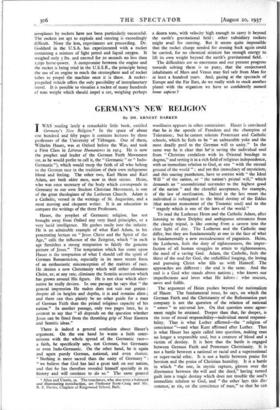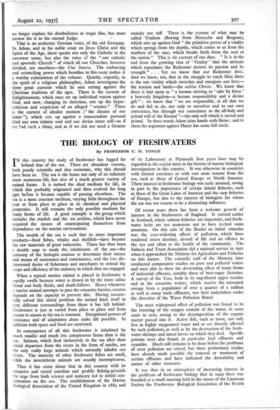GERMANY'S NEW RELIGION
By DR. ERNEST BARKER
T WAS reading lately a remarkable little book, entitled I Germany's New Religion.* In the space of about one hundred and fifty pages it contains lectures by three professors of the University of Tubingen. One of them, Wilhelm Hauer, was at Oxford before the War, and took a First Class in Litterae Humaniores in 1914. He is now the prophet and leader of the German Faith Movement (or, as he would prefer to call it, the " Germanic " or " Indo- Germanic"), which would steep the faith of all who belong to the German race in the tradition of their own indigenous blood and feeling. The other two, Kari Heim and Karl Adam, are both older men, now in their sixties. Heim, who was once secretary of the body which corresponds in Germany to our own Student Christian Movement, is one of the great theologians of the Lutheran Church. Adam is a Catholic, versed in the writings of St. Augustine, and a most moving and eloquent writer. It is an education to compare the writings of the three Professors.
Hauer, the prophet of Germanic religion, has not brought away from Oxford any very fixed principles, or a very lucid intelligence. He gushes easily into the infinite. He is an admirable example of what Karl Adam, in his penetrating lecture on " Jesus Christ and the Spirit of the Age," calls the influence of the Zeitgeist, which " in each age furnishes a strong temptation to falsify the genuine picture of Jesus." The temptation which has come upon Hauer is the temptation of what I should call the spirit of German Romanticism, especially in its most recent form of an enthusiastic misconception of the realities of race. He desires a new Christianity which will either eliminate Christ, or, at any rate, eliminate the Semitic accretion which has grown around His figure. He is not clear which alter- native he really desires. In one passage he says that " the general impression He makes does not suit our genius : despite all its heights and depths, it is and remains alien ; and there can thus plainly be no other guide for a man of German Faith than the primal religious capacity of his nation." In another passage, only two pages later, he is content to say that " all depends on the question whether Jesus can be freed from the throttling grip of Near Eastern and Semitic ideas."
There is indeed a general confusion about Hauer's argument. On the one hand he wants a faith coter- minous with the whole spread of, the Germanic race— a faith, he specifically says, not German, but Germanic or even Indo-Germanic. On the other hand, he is again and again purely German, national, and even itaiiste. " Nothing is more sacred than the unity of Germany " : " we believe that God has laid a great task on our nation, and that .he has therefore revealed himself specially in its history and will continue to do so." The same general
Allen and Unwin, 5s. The translators, who also write a balanced and illuminating introduction, are Professor Scott-Craig and Mr. R. E. Davies, Chaplain of Ringswood School, Bath.
woolliness appears in other connexions. Hauer is convinced that he is the apostle of Freedom and the champion of Toleration ; but he cannot tolerate Protestant and Catholic schools, which he feels to be " an unbearable yoke and the most deadly peril to the German will to unity." In the same way he is clear that he' is saving the individual soul from " Christian credalism with its Oriental bondage to dogma," and setting it in a rich field of religious independence, with an immediate relation to God, at one " with the eternal ground of the world " ; and yet this immediacy of mysticism, and this soaring pantheism, have to coexist with " the Ideal Will " of the nation, or " the nation's primal will," which demands an " unconditional surrender to the highest good of the nation " and the cheerful acceptance, for example, of the law of sterilisation. Indeed in the last resort the individual is subjugated to the blind destiny of the Eddas (that ancient monument of the Teutonic soul) and to the " tragedy which is one of the laws of the world."
To read the Lutheran Heim and the Catholic Adam, after listening to these Delphic and ambiguous utterances from the cloudy tripod, is like coming from a cavern into the clear light of day. The Lutheran and the Catholic may differ, but they are fundamentally at one in the face of what is fundamentally a new recrudescence of paganism. Heim, the Lutheran, feels the duty of righteousness, the imper- fection of all human struggles to attain to righteousness, the need of a saving God. Adam, the Catholic, feels the thirst of the soul for God, the unfulfilled longing, the loving and pursuing Christ who fills us with Himself. The approaches are different : the end is the same. And the end is a God who stands above nations ; who knows our imperfections and loves what He kthws : who rescues, saves and fulfils.
The argument of Heim pushes beyond the nationalism of Hauer. The fundamental issue, he says, on which the German Faith and the Christianity of the Reformation part company is not the question of the relation of national " nomos" to universal law. On that question some agree-. ment might be attained. Deeper than that, far deeper, is the issue of moral responsibility—individual moral responsi- bility. That is what Luther affirmed—the " religion . of conscience "—and what Kant affirmed after Luther. That is what Hauer has again called into question, making man no longer a responsible soul, but a creature of blood and a victim of destiny. It is here that the battle is engaged between German Faith and Protestant Christianity. It is not a battle between a national or racial and a supernational or super-racial ethic. It is not a battle between praise for heroism and the praise of Christian humility. It is a battle in which " the one, in mystic rapture, glosses over the dissonance between the will and the deed," having turned guilt into a tragic destiny which does not trouble the soul's immediate relation to God, and " the other lays this dis:. sonance, as sin, on the conscience of man," so that he can no longer explain his disobedience as tragic fate, but must answer for it to the eternal Judge.
That is an authentic German voice, of the old Germany. In Adam, and in his noble essay on Jesus Christ and the Spirit of the Age, there speaks not only the Catholic in the narrower sense, but also the voice of the " one catholic and apostolic Church " of which all our Churches, however divided, are members—the Una Sancta. The embracing and reconciling power which breathes in this essay makes it a worthy culmination of the volume. Quietly, cogently, in the spirit of a religious philosopher, Adam investigates the three great currents which he sees setting against the Christian tradition of the ages. There is the current of Enlightenment, which once set up individual reason against God, and now, changing its direction, sets up the hyper- criticism and scepticism of an alleged " science." There is the current of idealist monism (" the disease of our times "), which sets up against a transcendent personal God our own infinite soul and our divine inner self—as if we had such a thing, and as if we did not need a Greater outside our self. There is the c-urrent of what may be called Vitalism (flowing from Nietzsche and Bergson), which sets up against God " the primitive power of a vitality which springs from the depths, which comes to us from the mothers of the race, which breaks forth from the soul of the nation." This is the current of our days. " It is in the end from the growing idea of ' Vitality ' that the attitude which repudiates the Redeemer derives its passion and its strength " . . . Yet we know that our Redeemer lives. And we know, too, that in the struggle to reach Him there is the one vitality which stretches and energises our lives— the tension and battle—the militia Christi. We know that there is laid upon us " a human striving to ' take by force ' a heavenly kingdom—a human responsibility and a divine gift " : we know that " we are responsible, in all that we do and fail to do, not only to ourselves and to our own conscience, but through our conscience to the all-holy and primal will of the Eternal "—the only will which is sacred and primal. In these words Adam joins hands with Heim ; and in them the argument against Hauer has come full circle.







































 Previous page
Previous page